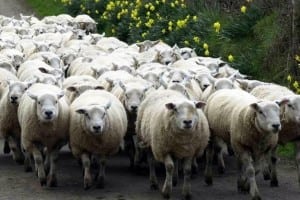Eid al-Adha, or the Festival of Sacrifice, is to celebrated soon,
and again Australian sheep have been sent en masse to the Middle East
for slaughter. The live export industry is becoming increasingly
irrelevant yet the Australian Government continues to bow to the live
export lobby at the expense of animal suffering.
Last
year 40,000 sheep died on their way to slaughter in the Middle East.
It’s not a quick death — they died from such things as starvation,
disease, injury and pneumonia. Australia’s live exporters measure their
success by the number of animals still standing at the end of the sea
voyage. They tout mortality statistics as though they are something to
be proud of, using percentages rather than the real numbers that tell a
side of the story that they don’t want people to think too closely
about. The reality is that tens of thousands of animals that embark on
these sea voyages out of Australia every year will not walk off at the
other end.
For them at least, the ordeal is over. For the others, it’s just the beginning.
Those
that do disembark, some 4 million sheep every year, may continue to
suffer from illness and heat stress. They arrive in countries with few
or no animal welfare laws to protect them and are often handled,
transported and slaughtered in a way that would be considered
unacceptable in Australia.
This November again marks
one of the worst periods for animal suffering in the Middle East.
During the three-day Islamic Festival of Sacrifice thousands of sheep
are slaughtered in homes, on footpaths and in overcrowded abattoirs.
The Australian Government condemns sheep to this fate with full
knowledge of what occurs. They do it despite the fact that live sheep
exports can no longer be defended on religious, cultural, ethical or
economic grounds. Perhaps most insulting; they do it knowing that our
involvement in this trade is not only costing Australian jobs but is
making just a token contribution to the economy.
This
year has been a turning point for the RSPCA’s campaign to end the live
sheep trade because the final argument to continue it – economics – is
now effectively off the table. Independent economists, ACIL Tasman,
have revealed that live sheep exports are actually costing jobs and
stifling our meat processing sector. Contrary to industry claims, we
now know that farmers don’t need live sheep exports and in fact many
are already moving into other, more lucrative areas; live sheep exports
do not underpin the price of sheepmeat domestically; and phasing out
the trade would have a modest impact on farmers and the economy. In
fact, Australia is missing out on potential value-adding opportunities
because our meat export industry is being forced to unfairly compete
with live sheep exports, which are heavily subsidised in the Middle
East.
The live export lobby talks about the industry
as if it is an entrenched Australian tradition. It isn’t. Live sheep
exports represent one market opportunity. But it is a market
opportunity that comes at a huge cost to the animals involved. It has
never made sense to the RSPCA why we would force animals to endure the
stress of long distance transport overseas, just to be slaughtered when
they get there. Not when our sheep meat exports are four times more
valuable to the economy than live sheep exports ($1.5 billion versus
$341 million in 2008). Australia has Halal-certified export abattoirs
supplying Halal meat to customers throughout the Middle East and there
is remarkable opportunity for growth. Meat processors in Western
Australia have signalled that if the live sheep trade ceased they could
increase their capacity almost immediately, creating 2000 jobs in that
state. These are jobs that truly support Australian regional
communities.
Unfortunately, it seems that there is
too much reliance on information provided by live exporters – a group
acting solely in their own interests. They do not represent the
interests of farmers and they certainly do not represent the interests
of animals. Their efforts to improve the welfare of sheep traded in
this market will only ever go to the extent that they do not impinge on
profits. Regardless of these efforts, no amount of regulation will
change the fact that sending sheep over such long distances is
stressful and inhumane. Nor will it change the fact that we relinquish
all control over Australian animals as soon as they get off the ship.
It’s
time for a positive discussion about new opportunities for Australia’s
sheep industry. Australian opportunities that will create jobs, boost
the economy and markedly improve animal welfare. A future free from
live sheep exports is achievable but it will take political courage. We
hope it comes from this Government and before one more animal is
sacrificed to this cruel trade.
Heather Neil is chief executive of RSPCA Australia.

